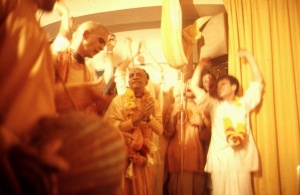CC Madhya 24.157: Difference between revisions
m (1 revision(s)) |
No edit summary |
||
| Line 1: | Line 1: | ||
{{ | [[Category:Sri Caitanya-caritamrta - Madhya-lila Chapter 24|C157]] | ||
<div style="float:left">'''[[Sri Caitanya-caritamrta|Śrī Caitanya-caritāmṛta]] - [[CC Madhya|Madhya-līlā]] - [[CC Madhya 24|Chapter 24: The Sixty-One Explanations of the Atmārāma Verse]]'''</div> | |||
<div style="float:right">[[File:Go-previous.png|link=CC Madhya 24.156|Madhya-līlā 24.156]] '''[[CC Madhya 24.156|Madhya-līlā 24.156]] - [[CC Madhya 24.158|Madhya-līlā 24.158]]''' [[File:Go-next.png|link=CC Madhya 24.158|Madhya-līlā 24.158]]</div> | |||
{{CompareVersions|CC|Madhya 24.157|CC 1975|CC 1996}} | |||
{{RandomImage}} | |||
==== TEXT 157 ==== | ==== TEXT 157 ==== | ||
<div | <div class="verse"> | ||
evaṁ harau bhagavati pratilabdha-bhāvo | :evaṁ harau bhagavati pratilabdha-bhāvo | ||
bhaktyā dravad-dhṛdaya utpulakaḥ pramodāt | :bhaktyā dravad-dhṛdaya utpulakaḥ pramodāt | ||
autkaṇṭhya-bāṣpa-kalayā muhur ardyamānas | :autkaṇṭhya-bāṣpa-kalayā muhur ardyamānas | ||
tac cāpi citta-baḍiśaṁ śanakair viyuṅkte | :tac cāpi citta-baḍiśaṁ śanakair viyuṅkte | ||
</div> | </div> | ||
| Line 14: | Line 18: | ||
==== SYNONYMS ==== | ==== SYNONYMS ==== | ||
<div | <div class="synonyms"> | ||
''evam''—thus; ''harau''—unto the Supreme Personality of Godhead; ''bhagavati''—the Lord; ''pratilabdha-bhāvaḥ''—one who has awakened a sense of ecstatic love; ''bhaktyā''—by devotional service; ''dravat''—melting; ''hṛdayaḥ''—the heart; ''utpulakaḥ''—very pleased; ''pramodāt''—because of happiness; ''autkaṇṭhya''—with eagerness; ''bāṣpa-kalayā''—with tears in the eyes; ''muhuḥ''—always; ''ardyamānaḥ''—merged in spiritual bliss; ''tat ca api''—that also; ''citta-baḍiśam''—with the heart like a fishing hook; ''śanakaiḥ''—gradually; ''viyuṅkte''—separates. | |||
</div> | </div> | ||
| Line 21: | Line 25: | ||
==== TRANSLATION ==== | ==== TRANSLATION ==== | ||
<div | <div class="translation"> | ||
"'When one is in ecstatic love with the Supreme Personality of Godhead, one's heart is melted by bhakti-yoga and one feels transcendental bliss. There are bodily symptoms manifest, and due to eagerness, there are tears in the eyes. Thus one is subjected to spiritual bliss. When the heart is overly afflicted, the meditative mind, like a fishing hook, is gradually separated from the object of meditation.' | |||
</div> | </div> | ||
| Line 28: | Line 32: | ||
==== PURPORT ==== | ==== PURPORT ==== | ||
<div | <div class="purport"> | ||
This is also a quotation from Śrīmad-Bhāgavatam ([[SB 3.28.34]]). | This is also a quotation from [[Srimad-Bhagavatam|''Śrīmad-Bhāgavatam'']] ([[SB 3.28.34]]). | ||
</div> | </div> | ||
__NOTOC__ | |||
<div style="float:right; clear:both;">[[File:Go-previous.png|link=CC Madhya 24.156|Madhya-līlā 24.156]] '''[[CC Madhya 24.156|Madhya-līlā 24.156]] - [[CC Madhya 24.158|Madhya-līlā 24.158]]''' [[File:Go-next.png|link=CC Madhya 24.158|Madhya-līlā 24.158]]</div> | |||
__NOTOC__ | |||
__NOEDITSECTION__ | |||
Revision as of 11:43, 14 September 2021

A.C. Bhaktivedanta Swami Prabhupada
TEXT 157
- evaṁ harau bhagavati pratilabdha-bhāvo
- bhaktyā dravad-dhṛdaya utpulakaḥ pramodāt
- autkaṇṭhya-bāṣpa-kalayā muhur ardyamānas
- tac cāpi citta-baḍiśaṁ śanakair viyuṅkte
SYNONYMS
evam—thus; harau—unto the Supreme Personality of Godhead; bhagavati—the Lord; pratilabdha-bhāvaḥ—one who has awakened a sense of ecstatic love; bhaktyā—by devotional service; dravat—melting; hṛdayaḥ—the heart; utpulakaḥ—very pleased; pramodāt—because of happiness; autkaṇṭhya—with eagerness; bāṣpa-kalayā—with tears in the eyes; muhuḥ—always; ardyamānaḥ—merged in spiritual bliss; tat ca api—that also; citta-baḍiśam—with the heart like a fishing hook; śanakaiḥ—gradually; viyuṅkte—separates.
TRANSLATION
"'When one is in ecstatic love with the Supreme Personality of Godhead, one's heart is melted by bhakti-yoga and one feels transcendental bliss. There are bodily symptoms manifest, and due to eagerness, there are tears in the eyes. Thus one is subjected to spiritual bliss. When the heart is overly afflicted, the meditative mind, like a fishing hook, is gradually separated from the object of meditation.'
PURPORT
This is also a quotation from Śrīmad-Bhāgavatam (SB 3.28.34).